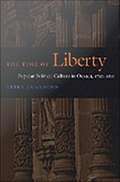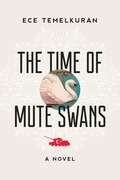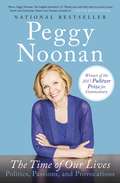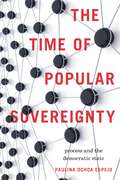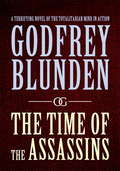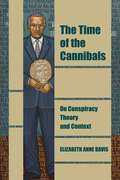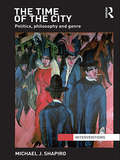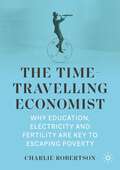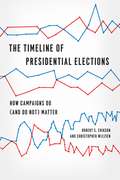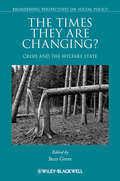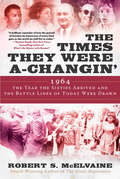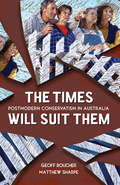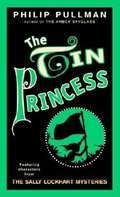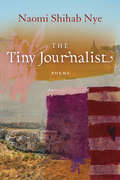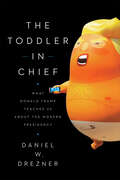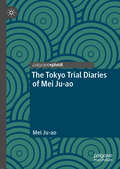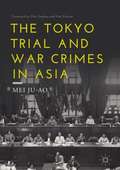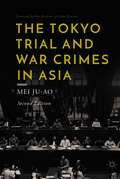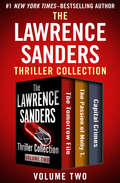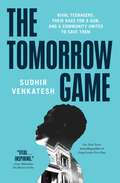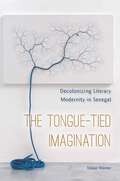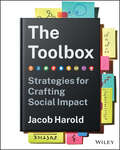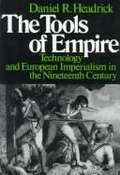- Table View
- List View
The Time of Liberty: Popular Political Culture in Oaxaca, 1750-1850
by Peter GuardinoBetween 1750 and 1850 Spanish American politics underwent a dramatic cultural shift as monarchist colonies gave way to independent states based at least nominally on popular sovereignty and republican citizenship. In The Time of Liberty, Peter Guardino explores the participation of subalterns in this grand transformation. He focuses on Mexico, comparing local politics in two parts of Oaxaca: the mestizo, urban Oaxaca City and the rural villages of nearby Villa Alta, where the population was mostly indigenous. Guardino challenges traditional assumptions that poverty and isolation alienated rural peasants from the political process. He shows that peasants and other subalterns were conscious and complex actors in political and ideological struggles and that popular politics played an important role in national politics in the first half of the nineteenth century. Guardino makes extensive use of archival materials, including judicial transcripts and newspaper accounts, to illuminate the dramatic contrasts between the local politics of the city and of the countryside, describing in detail how both sets of citizens spoke and acted politically. He contends that although it was the elites who initiated the national change to republicanism, the transition took root only when engaged by subalterns. He convincingly argues that various aspects of the new political paradigms found adherents among even some of the most isolated segments of society and that any subsequent failure of electoral politics was due to an absence of pluralism rather than a lack of widespread political participation.
The Time of Mute Swans: A Novel
by Ece TemelkuranAnkara, the capital city in the heart of Turkey at the crossroads of Europe and Asia, East and West, is a hotspot in the Cold War, torn between communism and conservatism, Western freedoms and traditional ways, with an army fearful of democracy and a government that employs thugs and torture to enforce law and order. In the summer of 1980, tensions are building. Homes of the poor are being burnt down. Armed revolutionaries on college campuses battle right-wings militias in the city's neighborhoods. The lines between good and bad, right and wrong, and beautiful and ugly are blurred by shed blood. Two children, one from a family living in misery and one well-off, form an alliance amid the turmoil. Through their senses, the cityscape unfolds its wonders, its rich smells and colors, as they try to make sense of the events swirling around them. And they hatch a plan. For the first time in generations, mute swans have migrated from Russia to the Black Sea and to a park at the center of Ankara. For the generals, they are an affirmation, and their wings must be broken so they can't fly away. But if the children can save one swan, won't they have saved the freedom of all?
The Time of Our Lives: Collected Writings
by Peggy NoonanPeggy Noonan is one of the most brilliant and influential political thinkers and writers of our time. The author of five bestselling books (What I Saw at the Revolution is now a classic), her column in The Wall Street Journalis a must-read for millions of Americans. Witty, incisive and always original, Peggy Noonan is a conservative intellectual with wide reaching appeal across the political spectrum. Now, for the first time, the best of Noonan's writing will be collected in one indispensible volume. With a special, original introduction, she chronicles her career in journalism, the Reagan White House, and the political arena. Annotated and analyzed throughout, Peggy expands a lifetime of wonderful writing into an astute examination of American life.
The Time of Popular Sovereignty: Process and the Democratic State
by Paulina Ochoa EspejoDemocracy is usually conceived as based on self-rule or rule by the people, and it is this which is taken to ground the legitimacy of the democratic form of government. But who constitutes the people? Democratic political theory has a potentially fatal weakness at its core unless it can answer this question satisfactorily. In The Time of Popular Sovereignty, Paulina Ochoa Espejo examines the problems the concept of the people raises for liberal democratic theory, constitutional theory, and critical theory. She argues that to solve these problems, the people cannot be conceived as simply a collection of individuals. Rather, the people should be seen as a series of events, an ongoing process unfolding in time. She then offers a new theory of democratic peoplehood, laying the foundations for a new theory of democratic legitimacy.
The Time of the Assassins
by Godfrey BlundenA terrifying novel of the totalitarian mind in action.In the late fall of 1941 the Germans entered Kharkov, at that time capital of the Ukraine. Sixteen months later the Red Army drove them out. The Time of the Assassins concerns what happened in the city between these two historical events. A terrifying dissection of German and Russian psychology, this is the story of the city's inhabitants, man of whom were hanged by the Germans when the retreating NKVD abandoned intact their records of Party membership. Others lived on with simple survival their only goal. Then, as the tide of war turned westward from Stalingrad, the Communist underground returned surreptitiously to Kharkov - and a new fear was abroad. Already distant artilllery fire was buising the empty windows. New assassins were soon to come.The subject is one few Westerners would have been equipped to write about, but Mr Blunden was among the handful of foreign correspondents to return to Kharkov with the victorious Russians. What he saw at first hand, plus his imaginative insight into the complex and desperate forces which had been at work during the German occupation, provided the genesis of The Time of the Assassins.
The Time of the Assassins
by Godfrey BlundenA terrifying novel of the totalitarian mind in action.In the late fall of 1941 the Germans entered Kharkov, at that time capital of the Ukraine. Sixteen months later the Red Army drove them out. The Time of the Assassins concerns what happened in the city between these two historical events. A terrifying dissection of German and Russian psychology, this is the story of the city's inhabitants, man of whom were hanged by the Germans when the retreating NKVD abandoned intact their records of Party membership. Others lived on with simple survival their only goal. Then, as the tide of war turned westward from Stalingrad, the Communist underground returned surreptitiously to Kharkov - and a new fear was abroad. Already distant artilllery fire was buising the empty windows. New assassins were soon to come.The subject is one few Westerners would have been equipped to write about, but Mr Blunden was among the handful of foreign correspondents to return to Kharkov with the victorious Russians. What he saw at first hand, plus his imaginative insight into the complex and desperate forces which had been at work during the German occupation, provided the genesis of The Time of the Assassins.
The Time of the Cannibals: On Conspiracy Theory and Context (Thinking from Elsewhere)
by Elizabeth Anne DavisIn 2009, the body of a former president of the Republic of Cyprus, Tassos Papadopoulos, was stolen from his grave. The Time of the Cannibals reconsiders this history and the public discourse on it to reconsider how we think about conspiracy theory, and specifically, what it means to understand conspiracy theories “in context.” The months after Papadopoulos’s body was stolen saw intense public speculation in Cyprus, including widespread expressions of sacrilege, along with many false accusations against Cypriots and foreigners positioned as his political antagonists. Davis delves into the public discourse on conspiracy theory in Cyprus that flourished in the aftermath, tracing theories about the grave robbery to theories about the division of Cyprus some thirty-five years earlier, and both to longer histories of imperial and colonial violence. Along the way, Davis explores cross-contextual connections among Cyprus and other locales, in the form of conspiracy theories as well as political theologies regarding the dead bodies of political leaders. Through critical close readings of academic and journalistic approaches to conspiracy theory, Davis shows that conspiracy theory as an analytic object fails to sustain comparative analysis, and defies any general theory of conspiracy theory. What these approaches accomplish instead, she argues, is the perpetuation of ethnocentrism in the guise of contextualization. The Time of the Cannibals asks what better kind of contextualization this and any “case” call for, and proposes the concept of conspiracy attunement: a means of grasping the dialogic contexts in which conspiracy theories work recursively as matters of political and cultural significance in the long durée.
The Time of the City: Politics, philosophy and genre (Interventions)
by Michael J ShapiroThe Time of the City is a trans-disciplinary work with a focus on genre-city relationships as they articulate the micropolitics of urban life in diverse cities. Shifting the territorial emphasis of political studies from the mosaic of states to the global network of cities, the book draws on urban theory rather than traditional forms of official city politics. Deriving their methodological approaches from aspects of urban theory and philosophies of aesthetics, the chapters deploy concepts from philosophy, political theory, literary studies, cinema studies, poetics and aesthetic theory on diverse cities, among which are Berlin, Hong Kong, London, Los Angeles, New York, Philadelphia and Washington, DC. Investigating a wide variety of urban formations, and developing a geophilosophy appropriate to urban space, this multi genre approach to urban life provides stunning insights into the micropolitics of ethnicity, identity, security, subjectivity and sovereignty.
The Time-Travelling Economist: Why Education, Electricity and Fertility Are Key to Escaping Poverty
by Charlie RobertsonThis insightful and original book explores the key issues that countries in Africa and South Asia need to address in order to escape poverty. Challenging traditional assumptions about the world’s poorest countries, the top priorities to address are identified as adult literacy, electricity for manufacturing, and the consequence of the relationship between fertility and savings. These suggestions are placed within a historical perspective, placing discussions on modern day Africa and South Asia alongside the development of East Asia, Europe, and the Americas in previous generations and centuries. The Time-Travelling Economist aims to move conversations about development beyond the resource curse or private sector failings, with a fresh focus on the policies that governments can embark on independently and affordably that will transform their future. It will be of interest to anyone interested in the future of the world’s low income countries.
The Timeline of Presidential Elections: How Campaigns Do (and Do Not) Matter
by Robert S. Erikson Christopher WlezienWith the 2012 presidential election upon us, will voters cast their ballots for the candidates whose platform and positions best match their own? Or will the race for the next president of the United States come down largely to who runs the most effective campaign? It's a question those who study elections have been considering for years with no clear resolution. In The Timeline of Presidential Elections, Robert S. Erikson and Christopher Wlezien reveal for the first time how both factors come into play. Erikson and Wlezien have amassed data from close to two thousand national polls covering every presidential election from 1952 to 2008, allowing them to see how outcomes take shape over the course of an election year. Polls from the beginning of the year, they show, have virtually no predictive power. By mid-April, when the candidates have been identified and matched in pollsters' trial heats, preferences have come into focus-and predicted the winner in eleven of the fifteen elections. But a similar process of forming favorites takes place in the last six months, during which voters' intentions change only gradually, with particular events-including presidential debates-rarely resulting in dramatic change. Ultimately, Erikson and Wlezien show that it is through campaigns that voters are made aware of-or not made aware of-fundamental factors like candidates' policy positions that determine which ticket will get their votes. In other words, fundamentals matter, but only because of campaigns. Timely and compelling, this book will force us to rethink our assumptions about presidential elections.
The Times They Are Changing?: Crisis and the Welfare State (Broadening Perspectives in Social Policy #12)
by Bent GreveThe Times They Are Changing? Crisis and the Welfare State presents a series of readings from international policy researchers that examine the effects of the recent financial crisis on welfare states around the world. Provides comprehensive and in depth coverage of changes in welfare states as a result of the financial crisis Reveals how the financial crisis is changing our perception of the welfare states Features contributions from policy researchers and academics from around the world
The Times They Were a-Changin': 1964, the Year the Sixties Arrived and the Battle Lines of Today Were Drawn
by Robert S McElvaineAn award-winning historian on the transformative year in the sixties that continues to reverberate in our lives and politics—for readers of Heather Cox Richardson.If 1968 marked a turning point in a pivotal decade, 1964—or rather, the long 1964, from JFK&’s assassination in November 1963 to mid-1965—was the time when the sixties truly arrived. It was then that the United States began a radical shift toward a much more inclusive definition of &“American,&” with a greater degree of equality and a government actively involved in social and economic improvement.It was a radical shift accompanied by a cultural revolution. The same month Bob Dylan released his iconic ballad &“The Times They Are a-Changin&’,&” January 1964, President Lyndon Johnson announced his War on Poverty. Spurred by the civil rights movement and a generation pushing for change, the Civil Rights Act, the Voting Rights Act, and the Immigration and Nationality Act were passed during this period. This was a time of competing definitions of freedom. Freedom from racism, freedom from poverty. White youth sought freedoms they associated with black culture, captured imperfectly in the phrase &“sex, drugs, and rock &’n&’ roll.&” Along with freedom from racist oppression, black Americans sought the opportunities associated with the white middle class: &“white freedom.&” Women challenged rigid gender roles. And in response to these freedoms, the changing mores, and youth culture, the contrary impulse found political expression in such figures as Barry Goldwater and Ronald Reagan, proponents of what was presented as freedom from government interference. Meanwhile, a nonevent in the Tonkin Gulf would accelerate the nation's plunge into the Vietnam tragedy.In narrating 1964&’s moment of reckoning, when American identity began to be reimagined, McElvaine ties those past battles to their legacy today. Throughout, he captures the changing consciousness of the period through its vibrant music, film, literature, and personalities.
The Times Will Suit Them: Postmodern conservatism in Australia
by Matthew Sharpe Geoff BoucherJohn Howard said, The times will suit me,' and they did. For over a decade John Howard took advantage of international crises and local anxieties to not only stay in government, but to radically reshape Australian public life.The Times Will Suit Them digs behind the headlines to explain the success of Howard's radical new conservatism. It shows how the Howard government and its small legion of culture warriors responded to deep changes engendered by two decades of economic reform by importing moral agendas from the US. The result was a brand of deeply postmodern' conservatism which undermined much that traditional conservatives hold dear.From Hansonism to children overboard to the Intervention in the Northern Territory and beyond, The Times Will Suit Them offers a fresh and provocative analysis from two Young Turks. It is compelling reading for anyone seeking to understand the drivers in contemporary Australian politics.
The Tin Princess (Sally Lockhart, Book #4)
by Philip PullmanDays after she witnesses a mysterious explosion in 19th-century London, sixteen-year-old Becky Winter is on her way to a small country in Central Europe, as a companion to Adelaide, a Cockney commoner who'd rather play board games than be a princess. But after an assassination makes Adelaide ruler of Razkavia, she rises to the occasion and her new station, gleefully playing international politics with the help of Becky and Jim Taylor, a dashing young detective.
The Tiny Journalist (American Poets Continuum Series #170)
by Naomi Shihab Nye“A moving testament to the impact one person can have and the devastating effects of occupation.” —Washington Post Best Poetry Books of 2019 Internationally beloved poet Naomi Shihab Nye places her Palestinian American identity center stage in her latest full-length poetry collection for adults. The collection is inspired by the story of Janna Jihad Ayyad, the "Youngest Journalist in Palestine," who at age 7 began capturing videos of anti-occupation protests using her mother's smartphone. Nye draws upon her own family's roots in a West Bank village near Janna's hometown to offer empathy and insight to the young girl's reporting. Long an advocate for peaceful communication across all boundaries, Nye’s poems in The Tiny Journalist put a human face on war and the violence that divides us from each other.
The Toddler in Chief: What Donald Trump Teaches Us about the Modern Presidency
by Daniel W. Drezner“[An] avalanche of repeated presidential absurdity. The reader realizes that this pattern is not part of the Trump presidency; it is the whole thing.” —Washington Post“Americans should know that there are adults in the room. . . . And we are trying to do what’s right even when Donald Trump won’t.” —An anonymous senior administrative official in a New York Times op-ed, September 5, 2018Every president faces criticism and caricature. Donald Trump, however, is unique in that he is routinely characterized in ways more suitable for a toddler. What’s more, it is not just Democrats, pundits, or protestors who compare the president to a child; Trump’s staffers, subordinates, and allies also describe Trump like a badly behaved preschooler.Daniel W. Drezner began curating every example he could find of a Trump ally describing the president like a toddler. So far, he’s collected more than one thousand tweets. In The Toddler-in-Chief, Drezner draws on these examples to take readers through the different dimensions of Trump’s infantile behavior, from temper tantrums to poor impulse control. How much damage can really be done by a giant man-baby? Quite a lot, Drezner argues, due to the winnowing away of presidential checks and balances over the past fifty years. Drezner also shows the lasting impact the Trump administration will have on American foreign policy and democracy, exhorting the American people to think carefully about the person they elect to be the next commander-in-chief. He also shows how we must rethink the terrifying powers we have given the presidency.“Occasionally funny . . . also overwhelmingly grim.” —New York Times“[A] crisp, witty and highly readable philippic.” —New Statesman
The Tokyo Trial Diaries of Mei Ju-ao
by Mei Ju-aoWritten by Chinese Jurist Mei Ju-ao, this significant book considers both the process and the impact of the International Military Tribunal for the Far East, otherwise known as the Tokyo Trial, which was convened in 1946 to try political military leaders accused of involvement in war crimes. Offering valuable research material on the establishment of the tribunal, it examines the background to the establishment of the International Military Tribunal and the lessons learned from earlier trials of World War One War Criminals. Written from the perspective of a Chinese prosecutor who was both jurist and witness, this unique text engages with the Tokyo Trial from an interdisciplinary perspective bringing in both international law and international relations, measuring over 7 decades later the significance and ongoing legacy of the Tokyo Trial for contemporary international criminal justice in Asia and beyond..
The Tokyo Trial and War Crimes in Asia
by Mei Ju-AoThis book examines the process and the impact of the International Military Tribunal for the Far East, otherwise known as the Tokyo Trial, which was convened in 1946 to try political military leaders accused of involvement in war crimes. Offering valuable research material on the establishment of the tribunal, it studies the background to the establishment of the International Military Tribunal and the lessons learned from earlier trials of World War One War Criminals. It addresses the IMTFE charter and records the establishment and development of the Tokyo Trial war crime principles, the confirmation of the Class A War Criminal list and the subsequent arrests and interrogations. It revisits the organization of the judges, the responsibilities of the prosecution and defense teams as well as the US representation in the defence. Offering the perspective of a Chinese prosecutor who was both jurist and witness, this unique text engages with the Tokyo Trial from an interdisciplinary perspective, bringing in both international law and international relations, and over seven decades later measures the significance and ongoing legacy of the Tokyo Trial for contemporary international criminal justice in Asia and beyond.
The Tokyo Trial and War Crimes in Asia
by Mei Ju-aoThe book examines the process and the impact of the International Military Tribunal for the Far East (IMTFE), otherwise known as the Tokyo Trial, which was convened in 1946 to try the Japanese leaders accused of committing war crimes during World War II. Offering valuable research materials, it studies the lessons learned from the failed attempt after World War I, and the background and establishment of the IMTFE. It elaborates on the Charter, the Indictment, the Proceeding Records, and the Judgment of the IMTFE, with an emphasis on principles of international law and other legal questions, often with reference to the Nuremberg Trial. It also discusses the structure and different parts of the court organization, the selection and prosecution of Class-A war criminals, and the trial procedures especially those relating to evidence. The author’s personal experience and his criticism of certain aspects of the Tokyo Trial make it most insightful for the reader. From the perspective of a Chinese judge, this unique text brings in the dimensions of both international law and international relations, and allows us to measure the significance and legacy of the Tokyo Trial for contemporary international criminal justice. The author’s manuscript of this book was written in Chinese in the mid-1960s as part of a larger project, and was initially published in 1988. This is the first time that this book has been translated into English.
The Tokyo University Trial and the Struggle Against Order in Postwar Japan (New Directions in East Asian History)
by Christopher PerkinsThis book explores the trial of over 600 students arrested at the University of Tokyo in 1969 after thousands of riot police had flooded the campus to end the students’ year-long occupation of the university. The trial, which was the largest in Japanese legal history and was remarkable for being the first to hear cases in the absence of defendants and their lawyers, quickly turned into a divisive struggle over legal process that spilled out of the courts into the media, and in so doing raised troubling questions about the legitimacy of the courts themselves. In making the case for the significance of this trial, this book places it within the context of the Japanese state’s attempts to manage social order, arguing that the Tokyo University trial was a moment in which a range of postwar themes – legal process and rights, courtroom order and authority, the proper role of lawyers, the social position of students, and the legitimacy of forms of policing – crystalized in a courtroom battle that pushed at the limits of Japan’s postwar sociologic order. The book also sheds new light on the students' experiences of the trial, exploring their time spent in detention and demonstrating how tensions internal to the student movement manifested during the trial process.
The Tomorrow File, The Passion of Molly T., and Capital Crimes: The Tomorrow File, The Passion of Molly T., and Capital Crimes
by Lawrence SandersThree gripping thrillers with settings ranging from a terrifying dystopia to a politically charged college campus, from the bestselling creator of the Edward X. Delaney Series. In the future, the government controls every aspect of its citizens' lives, from their gender and their genes to where they work, what they eat, and how they love. The Tomorrow File tells the story of what happens to utopia when people get fed up with pleasure, and stand up to fight for their right to live how they choose--and die for what they believe in. Activism runs rampant on the college campus where young Molly Turner seeks vengeance after her radical feminist girlfriend is killed by homophobic bigots. In The Passion of Molly T., there is a fine line between justice and mayhem. His name is Brother Kristos, and to the president of the United States, he is a savior, a holy man who has been able to do something no doctor could manage: heal the president's son. But as the president relies more and more on the mystic, the country slips toward chaos--and the explosive finale of Capital Crimes. These three novels from "master of suspense" Lawrence Sanders (TheWashington Post) show the world on the brink of disaster. Whether set in the distant future or the here and now, the thrillers in this three-volume omnibus will prove impossible to put down.
The Tomorrow Game: Rival Teenagers, Their Race for a Gun, and a Community United to Save Them
by Sudhir VenkateshA New York Times bestselling author&’s gripping account of a Chicago community coming together to save a group of teenagers from gun violence.In the tradition of works like Random Family and Behind the Beautiful Forevers, Sudhir Venkatesh&’s The Tomorrow Game is a deeply reported chronicle of families surviving in a Southside Chicago community. At the heart of the story are two teenagers: Marshall Mariot, an introverted video gamer and bike rider, and Frankie Paul, who leaves foster care to direct his cousin&’s drug business while he&’s in prison. Frankie devises a plan to attack Marshall and his friends—it is his best chance to showcase his toughness and win respect for his crew. Catching wind of the plan, Marshall and his friends decide they must preemptively go after Frankie&’s crew to defend their honor. The pressure mounts as both groups of teens race to find a gun and strike first. All the while, the community at large—a cast that includes the teens&’ families, black market gun dealers, local pastors, a bodega owner, and a veteran beat cop—try their best to defuse the conflict and keep the kids alive. Based on Venkatesh&’s three decades of immersion in Chicago&’s Southside, and as propulsive as a novel, The Tomorrow Game is a nuanced, timely look at the toll that poverty and gun violence take on families and their communities.
The Tongue-Tied Imagination: Decolonizing Literary Modernity in Senegal
by Tobias WarnerWinner, 2021 African Literature Association First Book AwardShould a writer work in a former colonial language or in a vernacular? The language question was one of the great, intractable problems that haunted postcolonial literatures in the twentieth century, but it has since acquired a reputation as a dead end for narrow nationalism. This book returns to the language question from a fresh perspective. Instead of asking whether language matters, The Tongue-Tied Imagination explores how the language question itself came to matter. Focusing on the case of Senegal, Warner investigates the intersection of French and Wolof. Drawing on extensive archival research and an under-studied corpus of novels, poetry, and films in both languages, as well as educational projects and popular periodicals, the book traces the emergence of a politics of language from colonization through independence to the era of neoliberal development. Warner reads the francophone works of well-known authors such as Léopold Senghor, Ousmane Sembène, Mariama Bâ, and Boubacar Boris Diop alongside the more overlooked Wolof-language works with which they are in dialogue.Refusing to see the turn to vernacular languages only as a form of nativism, The Tongue-Tied Imagination argues that the language question opens up a fundamental struggle over the nature and limits of literature itself. Warner reveals how language debates tend to pull in two directions: first, they weave vernacular traditions into the normative patterns of world literature; but second, they create space to imagine how literary culture might be configured otherwise. Drawing on these insights, Warner brilliantly rethinks the terms of world literature and charts a renewed practice of literary comparison.
The Toolbox: Strategies for Crafting Social Impact
by Jacob HaroldTransform your corner of the world with strategies from a social change visionary In The Toolbox: Strategies for Crafting Social Impact, celebrated nonprofit executive Jacob Harold delivers an expert guide to doing good in the 21st century. In the book, you'll explore nine tools that have driven world-shaking social movements and billion-dollar businesses—tools that can work just as well for a farmers market or fire department or small business. The author describes each of the tools—including storytelling, mathematical modeling, and design thinking—in a stand-alone chapter, intertwining each with a consistent narrative and full-color visual structure. Readers will also find: A consistent focus and emphasis on the work of social good and how it can be applied in any business, government agency, or nonprofit organization Dozens of poems, photos, equations, diagrams, and stories to illustrate and enrich of the core ideas of the book. A fulsome, three-chapter introduction offering an a crash course in the basics of social impact strategy in the 21st century A comprehensive strategic playbook for contributing to the shared work of building a better world An essential blueprint for anyone interested in improving the world around them, The Toolbox: Strategies for Crafting Social Impact is an incisive strategic guide that will prove to be indispensable for everyone who seeks to collaboratively build something better.
The Tools of Empire: Technology and European Imperialism in the Nineteenth Century
by Daniel R. HeadrickExcellent for global history courses because of its focus on Asia and Africa during the critical period of European imperialism.
